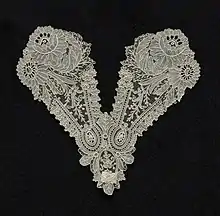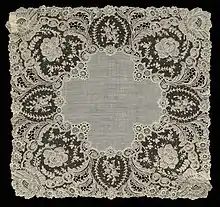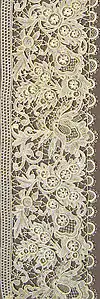Point de Gaze
Point de Gaze (sometimes Point de Gauze) is a needle lace from Belgium named for the gauze-like appearance of the mesh ground. It was made from the early to mid 1800s to the 1930s.

Etymology
The word lace is from Middle English, from Old French las, noose, string, from Vulgar Latin *laceum, from Latin laqueus, noose; probably akin to lacere, to entice, ensnare.[1] This type of lace takes its name from the fact that its ground mesh is very loose.[2]:87At one time, the French names of bobbin and needle laces were preceded by the word "point."[2]:86
Characteristics
Point de Gaze is made of open, twisted buttonhole stitches[3] of very fine thread.[4] The buttonholes connect through each other, yielding a light, gauze-like ground fabric. This type of lace uses floral designs.[4] Either cotton or linen thread can be used to make it. It was used to make clothing (dresses, shawls, and flounces) as well as accessories, such as handkerchiefs, parasols, and fans.[2]:87
Origins and History

Point de Gaze is a type of needlepoint lace that originated in the area of Brussels, Belgium. It was constructed from the middle of the 19th century until the 1930s.[4] One source indicates that its manufacture started earlier, in the 1830s.[2]:87
The Schiffli machine, which used net to mimic the gauze-like texture, was able to imitate the production of hand-made Point de Gaze lace.[4]
References
| Wikimedia Commons has media related to Point de gaze. |
- "Show election". Lace. Retrieved 2012-05-23.
- Bath, Virginia Churchill. (1979). Lace. Harmondsworth, Eng.: Penguin Books. ISBN 0-14-046378-X. OCLC 4494296.
- Stillwell, Alexandra. (1996). Cassell illustrated dictionary of lacemaking. London: Cassell. p. 164. ISBN 0-304-34145-2. OCLC 34597563.
- Earnshaw, Pat. (1999). A dictionary of lace. Mineola, NY: Dover. p. 131. ISBN 0-486-40482-X. OCLC 41518399.
